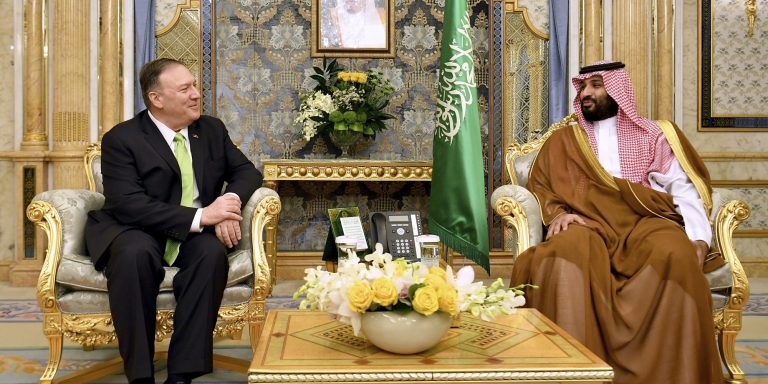INTELBRIEF
September 20, 2019
IntelBrief: Riyadh and Tehran Inch Closer to War

- U.S. Secretary of State Mike Pompeo traveled to Saudi Arabia on Wednesday, labeling the recent attack on Saudi oil infrastructure as an ‘act of war.’
- Though Saudi leaders have suggested Iranian involvement, they have stopped short of more definitive statements, leaving many in the region to wonder what might happen next.
- Saudi Crown Prince Mohammed bin Salman’s leadership has been most closely associated with a disastrous military stalemate in Yemen and an inability to curb the expansion of Iranian influence in the region.
- Iranian Foreign Minister Javad Zarif repeated that Iran had nothing to do with the attack, while also threatening that any strike against the Islamic Republic would result in ‘an all-out war.’
.
U.S. Secretary of State Mike Pompeo traveled to Jeddah, Saudi Arabia on Wednesday, labeling the recent attack on Saudi oil infrastructure as an 'act of war,' and suggesting that Washington would work with Riyadh to build a coalition of allies to deter future attacks against the kingdom. After meeting with the Saudis, Pompeo traveled to Abu Dhabi to meet with Prince Mohamed bin Zayed, the de facto ruler of the United Arab Emirates. Meanwhile, U.S. President Trump has vacillated between bellicose statements and offers of potential engagement with Iranian President Hassan Rouhani, finally settling on a 'middle course' of increasing sanctions while leaving open the possibility of talks.
Though Saudi leaders have suggested Iranian involvement, they have stopped short of more definitive statements, preferring ambiguity instead, which has left many in the region wondering what might happen next. The Saudi Defence Ministry displayed weapons parts recovered from the wreckage and proclaimed that the attack could not possibly have been launched by Houthi rebels in Yemen, given the distance involved (700 kilometers, or 435 miles). Saudi military spokesman Turki al-Malki stated that 18 drones and seven missiles were deployed in the attack on Khurais and Abqaiq. The Saudis tested air raid sirens across the country on Thursday, which some in the region interpreted as an indication that Riyadh was preparing for war against Iran and its growing network of proxies.
Although Saudi Crown Prince Mohammed bin Salman once portrayed himself as a reformer and a savior of Saudi Arabia’s future, his leadership has been most closely associated with a disastrous military stalemate in Yemen and an inability to curb the expansion of Iranian influence throughout the Middle East. When coupled with the string of tanker incidents over the summer, the most recent attack demonstrates that the so-called 'red lines' in the region have faded, and Iran now feels emboldened to act with relative impunity. Still, even as Tehran goes on the offensive, its leadership has been careful to avoid actions that might provoke a kinetic response from both regional and global powers, including the United States. The recent attack on Saudi oil infrastructure seems to go beyond previous actions, perhaps signaling that the Iranians feel a newfound sense of leverage, or are prepared to ramp up tensions while remaining confident that they can control escalation dynamics. Prince Faisal bin Farhan, Saudi Arabia's ambassador to Germany, noted that 'everything is on the table,' in response to a question about whether military retaliation by Saudi Arabia was imminent. The Saudis could eschew a direct attack on Iran and instead opt to strike Iranian targets elsewhere in the region, including in Syria.
On Thursday, Iranian Foreign Minister Javad Zarif repeated that Iran had nothing to do with the attack while also threatening that any strike against the Islamic Republic would result in 'an all-out war.' Zarif’s statement comes as recent reporting suggests that a U.S. official claimed that the attack was approved by Iran’s Supreme Leader, Ayatollah Ali Khamenei. The issue will be a major focus of next week’s meetings on the margins of the United Nations General Assembly (UNGA) in New York City, where Washington and Riyadh plan to raise the attack as an example of the danger of Iranian aggression. Many see the tit-for-tat as an outgrowth of the United States’ withdrawal from the Joint Comprehensive Plan of Action (JCPOA) and the Trump administration’s unwillingness to renegotiate a new nuclear deal, instead choosing to pursue crushing sanctions against Iran as part of its 'maximum pressure’ campaign.
.
For tailored research and analysis, please contact: info@thesoufancenter.org